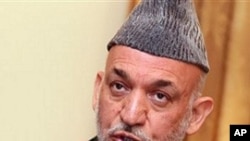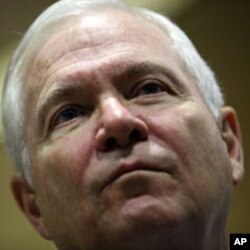Afghan President Hamid Karzai is meeting with world leaders with a new confidence, now that the international community supports his efforts to bring elements of the Taliban back into the Afghan government.
"This current effort, this renewed effort I should say, has the backing of our partners, in particular the United States and Europe," he said.
While in Turkey with Mr. Karzai earlier this week, Pakistani President Asif Ali Zardari gave his endorsement of the strategy.
"If there are any people who are the 'reconcilables' or people who want to give up their way of life, the democratic governments or the democracy always welcomes them back," said the Afghan president.
The Pakistani government has long maintained that starting a dialogue with Taliban militants in Afghanistan could pave the way for stability in the country.
At the same time, Pakistan's military is fighting in the South Waziristan tribal area against the so-called Pakistani Taliban, which are blamed for a series of attacks in the country.
Coalition commanders are pushing Pakistan to go after sanctuaries of the Afghan Taliban and al-Qaida operatives, based in the neighboring North Waziristan tribal area. They believe these elements are a major cause of instability in eastern Afghanistan.
During his recent trip to Pakistan, U.S. Defense Secretary Robert Gates stressed that Islamabad should not distinguish between any militants in its border regions.
"Safe havens for either Taliban, on either side of the border, will in the long-run lead to more lethal and more brazen attacks in both nations - attacks of the kind that have already exacted a terrible civilian toll," he said.
Former Pakistani Foreign Secretary Najmuddin Shaikh says Pakistan is hesitant to open a new military front, before securing current gains.
He says Pakistan hopes there will now be more coordination between the coalition and its military along the border.
"You have the situation that, if you moved into North Waziristan, and Paktia, Paktika and Khost remain bereft of Afghan national army or NATO troops of anything of that sort, I'm not sure that the old hammer and anvil is going to work if there is no anvil," he said.
American and British officials have promised to address these concerns in London.
Shaikh says stability in Pakistan's border regions is vital, especially as the U.S.-led coalition sends in more troops to the landlocked Afghanistan. Nearly 70 percent of NATO's supplies travel through these militant-dominated border areas of Pakistan, particularly the Khyber region. Shaikh says the current situation there is precarious, as militants flee the Pakistani military.
"The pressure that is being put on in South Waziristan is leading to an influx into Khyber, which in turn endangers this particular route," he said.
NATO convoys traveling through Pakistan's border regions have come under repeated militant attacks since the fall of Afghanistan's Taliban-led government.
It is believed that the Pakistani military helped establish the Taliban in Afghanistan after Soviet forces left the country, more than two decades ago. Because of this, some analysts believe Pakistan can help encourage the militants to come to peace talks.
But critics like Shaikh suspect whether Pakistan still maintains influence on the current generation of militants. He says the London conference will be instrumental in moving forward.
"The new people that have been fighting have again been at it since they were born, sort of situation. So I think that there would be people that would be willingly to get out, provided that they were offered the right inducements, provided that things were done properly," he added.
Shaikh says that whether the outcome of the London conference leads to a more workable strategy to bring peace to Afghanistan, the region has become a major challenge for the Obama administration.
The U.S. president says he hopes to begin withdrawing American forces from Afghanistan in the middle of next year.
But the United Nations says, if the international community does not reexamine the political situation and military strategy in Afghanistan, efforts to bring peace will likely fail.





